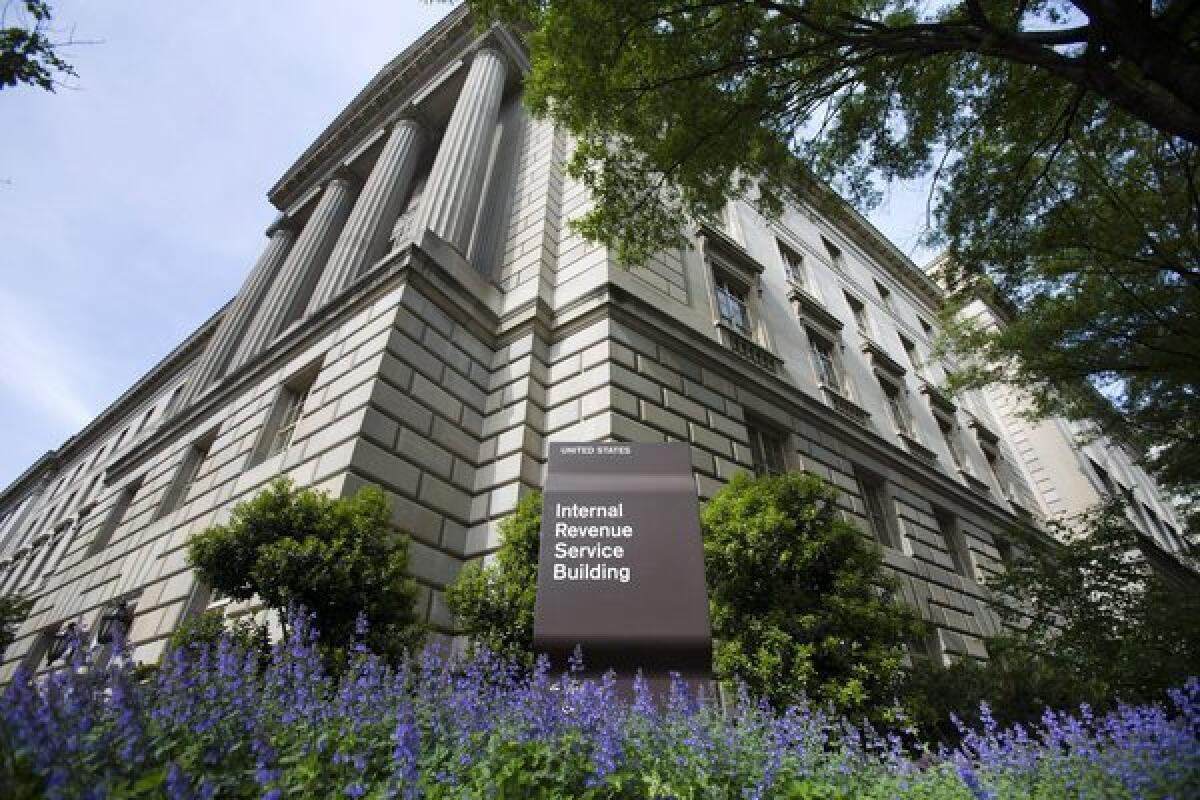New details -- good and bad -- from the IRS inspector general’s report

- Share via
A new report by the Internal Revenue Service’s inspector general offered a few new details Tuesday about the scandal revolving around the IRS’ treatment of “tea party” groups seeking tax-exempt status. Those details were in part damning and in part exculpatory. Collectively, though, they shred the argument from the agency’s defenders that the IRS was right to crack down on those groups.
Bear in mind that the report doesn’t address important aspects of the scandal. Most notably, it says nothing about any communications IRS officials may have had with the White House or President Obama’s political appointees about the reviews. Nor does it address why top IRS officials were telling Congress repeatedly in 2012 that there was no targeting of conservative groups, even as agency managers were trying to refine the process of flagging applications for tax-exempt status to make it more politically neutral.
Here’s the background, according to the report from the Treasury Inspector General for Tax Administration. Section 501(c)(4) of the tax code exempts “social welfare” groups that lobby and engage in a limited amount of campaign activity, although donations to these groups are not tax deductible. Starting in May 2010, a Cincinnati-based IRS unit that reviewed applications for tax-exempt status started developing a way to identify applicants that didn’t qualify because their main purpose was to influence elections.
READER OPINION: Outraged over IRS snooping scandal? Readers aren’t
I blogged about the inspector general’s investigation last week, and The Times’ editorial board weighed in Tuesday morning. The report confirms the thrust of the media coverage to date, namely, that applications from groups hostile to the Obama administration were delayed for months, and that a number of these groups were subjected to extensive, intrusive and inappropriate demands for information.
Now for the new details. First, here are some of the tidbits that make the IRS seem less biased, although also less competent:
- Two-thirds of the applications that were set aside for scrutiny were not from “tea party” or “patriot” groups. And almost 70% of the applications that were flagged really did raise concerns about an excessive amount of campaign activity, the report states.
- The vast majority of the applications that weren’t set aside for tough scrutiny came from groups with no apparent involvement in political activity. Only 2% to 6% of these “had indications of significant political campaign intervention” that merited further review, the report says.
- Some flagged applications sat for a year and a half or more without a decision because the agency’s management took 20 months to develop draft guidelines for processing them. As of February -- more than 14 months after the draft guidelines were issued -- the agency still had not developed final guidelines. Those guidelines dealt with such crucial questions as how to determine whether an organization’s primary activity was social welfare.
And here are some of the details that discredit the IRS:
- Every application with “tea party,” “patriot” or “9/12” in its name was flagged for a special review.
- Of the 170 organizations that received requests for additional information, more than half were asked for items that weren’t necessary to evaluate their applications. The report blamed the lack of guidance from management for that problem (see above). But some of the requests for information are just dumbfounding, such as the 27 applicants that were asked to reveal a list of all previous donors and the amounts given, and identify which ones have or plan to run for office.
- In addition to the requests for donor lists, the report identified six other inappropriate demands for information. These included listing the issues the organization was interested in and what positions it took on them, the political affiliations of its officers, speakers and the candidates it supported, and the hours worked for employers outside the organization.
What’s truly damning about these requests for information is that they served no purpose other than to reveal the political leanings of the applicants. The tax code doesn’t care who belongs to or contributes to a 501(c)(4), or what they believe. It cares only what they do with their money.
Some left-of-center defenders of the agency say that tea party groups deserved the scrutiny because their raison d’etre is to change government by electing people they trust to Congress and the White House. Even if that’s true, it shouldn’t matter to the IRS how these groups feel about Washington. It should matter only what they do and how they plan to spend the money they raise.
Addendum: Obama just issued a hedge-free denunciation of the IRS’ actions:
“I have now had the opportunity to review the Treasury Department watchdog’s report on its investigation of IRS personnel who improperly targeted conservative groups applying for tax-exempt status. And the report’s findings are intolerable and inexcusable. The federal government must conduct itself in a way that’s worthy of the public’s trust, and that’s especially true for the IRS. The IRS must apply the law in a fair and impartial way, and its employees must act with utmost integrity. This report shows that some of its employees failed that test.”
Obama said he instructed Treasury Secretary Jack Lew to make sure the IRS -- an independent agency -- implemented all the inspector general’s recommendations. He made no mention, though, of Atty. Gen. Eric H. Holder Jr.’s decision to start a criminal probe.
ALSO:
Florida defection costs GOP another Latino leader
Outraged over IRS snooping scandal? Readers aren’t
Angelina Jolie, the Supreme Court and gene patents
Follow Jon Healey on Twitter @jcahealey
More to Read
A cure for the common opinion
Get thought-provoking perspectives with our weekly newsletter.
You may occasionally receive promotional content from the Los Angeles Times.











